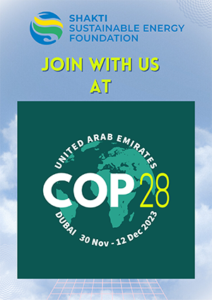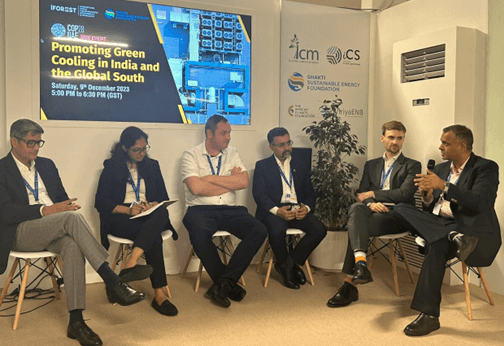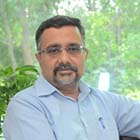
Venue: Regional Climate Foundations Pavillion- COP28 (Pavilion No – TA3-145), Blue zone– B7 and building 88 (Ground floor of building 88, left-hand side)
Date: December 9, 2023
Time: 16:30 to 18:00 GST
To join the event please register below
Register

Moderator: Chandra Bhushan, CEO & President, iFOREST
Panelist:
- Philipp Denzinger, Project Manager, GIZ Proklima International
- Thomas Spencer, International Energy Agency
- Jayanta Chaudhuri, Director, Alliances & Partnership · Alliance for an Energy Efficient Economy
- Sachin Kumar, Director, Shakti Sustainable Energy Foundation
- Mridula Pandey, Manager (India – Climate), Children’s investment Fund Foundation
Concluding Remarks: Chandra Bhushan, CEO & President, iFOREST
Dr Sachin Kumar, Director Industry, Building & Cooling Programme, Shakti, shared his views on initiatives on Green cooling in India and how India can take lead in Global South to address growing challenge of expected increase in refrigerant demand and related GHG emissions from the cooling sector during this event on ‘Promoting Green Cooling in India and the Global South’ organised by i-Forest.
Dr Sachin Kumar, Director Industry, Building & Cooling Programme, Shakti, shared his views on initiatives on Green cooling in India and how India can take lead in Global South to address growing challenge of expected increase in refrigerant demand and related GHG emissions from the cooling sector during an event on ‘Promoting Green Cooling in India and the Global South’ organised by i-Forest on December 9, 2023 at COP 28.
Demand for cooling in India has been rising exponentially. According to the World Energy Outlook 2023, the ownership of air conditioners (ACs) in the country has tripled since 2010 to reach 24 units per 100 households. The steep cooling demand growth is projected to continue in the coming decades. By 2050, household AC ownership in India is projected to increase ninefold, leading to a ninefold increase in energy demand for cooling.
Low-GWP natural refrigerant-based cooling technologies remain on the fringes of adoption in India despite low climate impact, patent-free status, and market readiness. Incremental progress has been made due to the India Cooling Action Plan (ICAP) and the Bureau of Indian Standards (BIS) adoption of safety standards for natural refrigerants. The main barriers to adoption are low awareness among residential and commercial consumers, high initial cost, a limited manufacturing base and challenges with retrofitting. A panel of distinguished experts deliberated on the following set of topics to provide the solution to the above-mentioned barriers and a way forward for achieving green cooling:
- Illustrating lessons from India to champion green cooling in Global South nations
- Strategising to tackle continued implementation hurdles of policy, finance, awareness and capacity.
- Determining the scale of international financial and technical aid necessary for green cooling and the mechanisms to mobilise such support
Speaker’s bios
Philipp Denzinger
Project Manager, GIZ Proklima International
 Philipp Denzinger has and worked previously in the automotive industry for BMW. Since 2008 and has been working for Deutsche Gesellschaft für Internationale Zusammenarbeit (GIZ) GmbH, in and with many countries of the Global South. As a project manager for GIZ Proklima, he is in charge of implementing projects under the Montreal Protocol (MP) and Paris Agreement (PA). He is currently overseeing projects in around 25 countries and for 9 years he has been working related to green air conditioners, which are highly energy efficient and use natural refrigerants that are not harmful to the ozone layer and have no negative climate and environmental impact.
Philipp Denzinger has and worked previously in the automotive industry for BMW. Since 2008 and has been working for Deutsche Gesellschaft für Internationale Zusammenarbeit (GIZ) GmbH, in and with many countries of the Global South. As a project manager for GIZ Proklima, he is in charge of implementing projects under the Montreal Protocol (MP) and Paris Agreement (PA). He is currently overseeing projects in around 25 countries and for 9 years he has been working related to green air conditioners, which are highly energy efficient and use natural refrigerants that are not harmful to the ozone layer and have no negative climate and environmental impact.
Thomas Spencer,
International Energy Agency
 Thomas Spencer has a Masters in Carbon Management, focusing on energy economics and regulation, from the University of Edinburgh. He has more than a decade of experience in the fields of energy and climate change policy in Europe, China and India. He was Director of the Energy and Climate Change Program at the Institute for Sustainable Development and International Relations (IDDRI) in Paris, France. He was a member of the French delegation that organised COP21 in 2015, which resulted in the Paris Agreement on Climate Change. Between 2017 and 2021, he was a Fellow at the Energy and Resources Institute (TERI) in New Delhi, India, where his work focused on modelling the expansion and operation of the Indian electricity system under increasing shares of variable renewables. In March 2021, Thomas joined the Energy Modelling Office of the International Energy Agency (IEA).
Thomas Spencer has a Masters in Carbon Management, focusing on energy economics and regulation, from the University of Edinburgh. He has more than a decade of experience in the fields of energy and climate change policy in Europe, China and India. He was Director of the Energy and Climate Change Program at the Institute for Sustainable Development and International Relations (IDDRI) in Paris, France. He was a member of the French delegation that organised COP21 in 2015, which resulted in the Paris Agreement on Climate Change. Between 2017 and 2021, he was a Fellow at the Energy and Resources Institute (TERI) in New Delhi, India, where his work focused on modelling the expansion and operation of the Indian electricity system under increasing shares of variable renewables. In March 2021, Thomas joined the Energy Modelling Office of the International Energy Agency (IEA).
Jayanta Chaudhuri
Director, Alliances & Partnership · Alliance for an Energy Efficient Economy
 Jayanta Chaudhuri is a sales and marketing professional with over twenty five years’ experience in business development, key account management, and alliances. Having handled strategic portfolios across diverse products and services, and geographies, Jayanta is a keen enterprise-relationship enabler. A serious runner who draws life’s lessons from running, he believes in team spirit, team work and in building self-sustained communities. Before joining AEEE, he worked with The Times Group, where he was the National Business Head for consumer durables and telecom verticals, responsible for integrated media solutions across traditional and new age media. Jayanta is a Physics graduate from St. Stephen’s College, Delhi, and an MBA from FMS Delhi. Present PMVA Local board member in India.
Jayanta Chaudhuri is a sales and marketing professional with over twenty five years’ experience in business development, key account management, and alliances. Having handled strategic portfolios across diverse products and services, and geographies, Jayanta is a keen enterprise-relationship enabler. A serious runner who draws life’s lessons from running, he believes in team spirit, team work and in building self-sustained communities. Before joining AEEE, he worked with The Times Group, where he was the National Business Head for consumer durables and telecom verticals, responsible for integrated media solutions across traditional and new age media. Jayanta is a Physics graduate from St. Stephen’s College, Delhi, and an MBA from FMS Delhi. Present PMVA Local board member in India.
Sachin Kumar,
Director, Shakti Sustainable Energy Foundation
 Sachin Kumar energy professional with over 20 years of demonstrated experience across various dimensions of energy efficiency, Sachin has facilitated the low-carbon growth of various energy-intensive industry segments in the sector through research design, knowledge sharing and capacity building. Sachin has extensive experience in working closely with policy makers, industry leaders, opinion-makers, funding organisations, and sector experts in the energy efficiency domain. Before joining Shakti in December 2021, he worked with The Energy and Resources Institute (TERI) as Senior Fellow & Area Convenor (Industrial Energy Efficiency). Sachin has a Ph.D. from TERI University, MA in Environmental Engineering from Punjab Engineering College and a B.Tech degree in Civil Engineering from REC Hamirpur.
Sachin Kumar energy professional with over 20 years of demonstrated experience across various dimensions of energy efficiency, Sachin has facilitated the low-carbon growth of various energy-intensive industry segments in the sector through research design, knowledge sharing and capacity building. Sachin has extensive experience in working closely with policy makers, industry leaders, opinion-makers, funding organisations, and sector experts in the energy efficiency domain. Before joining Shakti in December 2021, he worked with The Energy and Resources Institute (TERI) as Senior Fellow & Area Convenor (Industrial Energy Efficiency). Sachin has a Ph.D. from TERI University, MA in Environmental Engineering from Punjab Engineering College and a B.Tech degree in Civil Engineering from REC Hamirpur.
Dr Sachin Kumar, Director Industry, Building & Cooling Programme, shared his views on initiatives on Green Cooling in India and how India can take lead in Global South to address growing challenge of expected increase in refrigerant demand and related GHG emissions from the cooling sector.
Mridula Pandey,
Manager (India – Climate), Children’s investment Fund Foundation
 Mridula is Manager (Climate) at Children’s Investment Fund Foundation, one of the largest philanthropies dedicated to improving the lives of children. As part of the Climate team in India, Mridula manages a portfolio that cuts across clean energy transition, air pollution, accelerating transport decarbonisation, making Indian cities climate-compatible and low-natural farming. She started her career as a researcher-cum-copywriter, covering extensively developments in India’s then nascent renewable energy sector. During her various stints, Mridula has garnered experience that spans the private, government and civil society space. She was previously with the United Nations Development Programme (UNDP) on secondment to the India’s Ministry of Finance, where she advised and provided technical support to India’s representatives at various multilateral fora including the Global Environment Facility (GEF) and the Green Climate Fund (GCF). Mridula holds a Master’s degree in Economics and is based out of New Delhi.
Mridula is Manager (Climate) at Children’s Investment Fund Foundation, one of the largest philanthropies dedicated to improving the lives of children. As part of the Climate team in India, Mridula manages a portfolio that cuts across clean energy transition, air pollution, accelerating transport decarbonisation, making Indian cities climate-compatible and low-natural farming. She started her career as a researcher-cum-copywriter, covering extensively developments in India’s then nascent renewable energy sector. During her various stints, Mridula has garnered experience that spans the private, government and civil society space. She was previously with the United Nations Development Programme (UNDP) on secondment to the India’s Ministry of Finance, where she advised and provided technical support to India’s representatives at various multilateral fora including the Global Environment Facility (GEF) and the Green Climate Fund (GCF). Mridula holds a Master’s degree in Economics and is based out of New Delhi.


